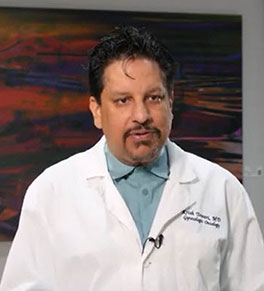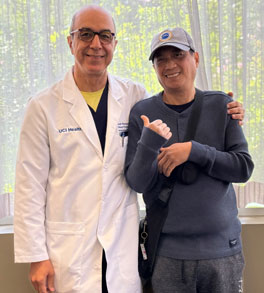
Coronary Artery Bypass Grafting (CABG)
While open-heart surgery can be overwhelming, our heart surgery team will guide you through every step.
Our approach to CABG
When you have blockages in the arteries, your heart isn’t getting enough blood or oxygen to function normally. This results in coronary artery disease, which puts you at risk for heart attack and other life-threatening heart problems.
One of the most effective treatments for coronary artery disease is coronary artery bypass grafting (CABG). Through bypass surgery, your UCI Health heart surgeon directs blood back to the heart. This allows your heart to function properly, which alleviates your coronary artery disease symptoms and improves your heart health.
Although CABG is the most common, well-studied surgery in the U.S., UCI Health heart surgeons don’t take a one-size-fits all approach to bypass surgery.
Your surgeon will take the time to determine the best approach for your specific needs. This may include how many arteries need to be bypassed and whether you are a candidate for minimally invasive CABG.
Goals for bypass surgery
- Help you live a longer, more active life
- Treat your coronary artery disease
- Alleviate symptoms like shortness of breath, chest pain and fatigue
- Reduce your long-term risk for heart attack and other life-threatening heart problems
We’re committed to helping you feel better and return to doing activities you love.
Am I a candidate for CABG?
If you have coronary artery disease, CABG could be the right option for you. Your doctor may recommend bypass surgery if:
- You have multiple blockages in your arteries
- You have a severe blockage
- You have heart damage from a heart attack
- Medications and lifestyle changes are not helping improve your coronary artery disease
- Other treatments or procedures, like stenting or angioplasty, can no longer effectively treat your blockages
Benefits of CABG
CABG clears blockages and improves your heart health. Bypass surgery significantly lowers your risk for life-threatening heart conditions.In fact, many people who have had CABG live long, healthy lives even decades after having the bypass surgery.
What to expect with CABG
CABG is a major open-heart surgery. You’ll recover in the hospital after surgery for several days. And you’ll do cardiac rehab to regain your strength for months after surgery.
Here’s what you can expect during your CABG surgery:
- Your anesthesiologist will give you general anesthesia to keep you asleep and comfortable throughout the procedure.
- Your surgical team will put you on a ventilator to help you breathe.
- Your surgical team will connect you to a heart-lung bypass machine to take over your heart and lung function.
- Your surgeon will make a large incision on your chest to access your heart.
- Your surgeon will then perform the complex bypass and grafting procedure.
- Your surgical team will attach healthy blood vessels from other parts of your body to the blocked arteries. This allows blood and oxygen to start flowing to your heart again.
- The surgery typically takes four to six hours.
Recovery after CABG
Immediately after bypass surgery, you’ll recover in our cardiac intensive care unit (ICU) for one or two days. Your care team will remove the ventilator, take you off the heart-lung bypass machine and monitor you.
Once you’re stable, your care team will move you from the cardiac ICU to a surgical recovery unit. Once there, our goal is to get you up and walking around as soon as possible. You’ll work closely with our physical and occupational therapists to start moving and ease into daily activities.
Our team will also guide you through everything you need to know to continue recovering at home. This includes:
- Reviewing wound care instructions
- Going over guidelines for easing back into more and more activities
- Referring you for cardiac rehab to help you regain your strength and confidence
- Setting up follow-up appointments with your care team
You can typically resume normal activities about eight to 12 weeks after surgery. Your care team will work with you to ensure you safely come back stronger and healthier.
Minimally invasive CABG
UCI Health heart surgeons are also pioneers in minimally invasive coronary bypass surgery. This approach is only offered at select academic health systems in the U.S.
Rather than open-heart surgery, our heart surgeons can access your heart through just a small incision. This less-invasive surgery allows us to repair blockages without using a heart-lung bypass machine.
The benefits of a minimally invasive CABG are:
- Faster recovery
- Less pain
- Fewer risks
- Less time in the hospital
However, minimally invasive CABG is a newer procedure. It is not yet an option for everyone. Your surgeon will discuss if it’s right for you.
Why choose UCI Health for CABG?
Cardiac ICU
After your CABG surgery, you’ll recover in our cardiac ICU. In this critical care unit, our specially trained heart specialists provide care specifically for people who’ve had bypass surgery. This high level of expertise ensures that you receive hyper-specialized, seamless care to ensure you recover well after open-heart surgery.
Advanced technologies for complex heart surgeries
If you have a complex condition that requires CABG, our team can help. In fact, cardiologists across the region often refer patients to our team of expert heart surgeons. We successfully take on the most complex, high-risk heart surgeries in Orange County. We can do this thanks to our experienced surgeons and care teams, comprehensive care after surgery and advanced technologies.
Leaders in heart surgery
At UCI Health, we’re always looking at ways to help people recover after major surgery like CABG. As the only academic health system in Orange County, UCI Health leads and participates in research and clinical trials. These trials look at ways to improve recovery after open-heart surgery, including improving pain management and reducing risks for complications.
Minimally invasive coronary bypass surgery
Our heart surgeons offer minimally invasive coronary bypass surgery, which is only offered at select academic health systems nationally. This procedure allows us to perform bypass surgery without fully opening your chest with a sternotomy. Instead, we access your heart through a smaller incision between your ribs. This leads to a faster recovery, with less pain and a lower risk for complications.

Schedule a consultation
Call 714-456-6699 to meet with our heart surgeons to find out how CABG can help treat your coronary artery disease.
Featured Blog Posts

Examining the latest in cervical cancer care
UCI Health gynecologic oncologist Dr. Krishnansu Tewari deciphers the evolving landscape of a preventable disease.

Parkinson’s disease: Knowledge is power

Drummer beats back kidney cancer in clinical trial
Glenn Marquez is hitting the skins again after enrolling in a clinical trial to treat advanced renal cell carcinoma.




